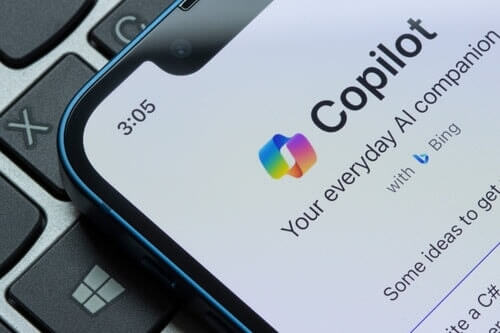
Legal Teams Driving Cost Savings with Microsoft Copilot
In the ever-changing realm of the legal profession, the incorporation of artificial intelligence (AI) has taken centre stage, marking the onset of a transformative era.
According to Goldman Sachs' 2023 projections, around 44% of legal tasks are positioned for automation by adopting generative AI. Additionally, collaborative research conducted by Microsoft and the Tech Council of Australia emphasises that a substantial 10% of legal tasks could undergo complete automation, while an additional 32% stand to benefit from augmentation through AI technologies.
A Code Completion Powerhouse
Generative AI's unique attribute lies in its ability to produce inventive content spanning text, images, and code, setting it apart from other AI technologies that rely on pattern recognition. Platforms like ChatGPT have played a crucial role in making this transformative technology accessible to the general public. Amid this technological advancement, a noteworthy breakthrough emerges – Microsoft's Copilot. This AI tool, constructed on OpenAI's GPT-3.5 architecture, is reshaping the approach of legal professionals by streamlining processes and elevating overall efficiency.
Microsoft Copilot, built on OpenAI's GPT-3.5 architecture, stands out as an advanced AI-powered language model. Its unique feature lies in its capacity to generate entire lines of code or text, surpassing traditional autocomplete functions. Trained on a diverse range of data sources, Copilot demonstrates a deep understanding of the complex language inherent in legal practices.
Unleashing Transformative Potential
- Accelerating Document Creation and Review: Microsoft Copilot is an instrumental asset in the legal field, particularly in expediting the document drafting and review process. By suggesting contextually relevant language and providing drafting recommendations, Copilot assists legal professionals in crafting legal documents, contracts, and briefs. This not only speeds up document creation but also contributes significantly to maintaining consistency and precision in the realm of legal paperwork.
- Sophisticated Support for Legal Research: Functioning as a sophisticated research assistant, Copilot plays a critical role in legal research. Rapidly delivering pertinent insights into legal precedents, statutes, and case law, Copilot goes beyond generating effective search queries and refining results. Its multifaceted capabilities extend to enhancing legal analysis by suggesting arguments and reasoning grounded in case law and other legal sources. This robust AI tool streamlines the process of finding precedents and elevates the quality of legal argumentation.
- Driving Code Generation for Legal Tech Advancements: Amid the dynamic evolution of legal technology, Copilot stands out as an indispensable resource for developers. Possessing an understanding of the intricacies inherent in legal coding and regulations, Copilot becomes a valuable asset in generating tailored code snippets for software applications specifically designed for the legal industry.
- Enabling Transparent Client Communication: Copilot's proficiency in comprehending and generating human-like text extends seamlessly to client communication. Legal professionals leverage Copilot to craft clear and concise messages, ensuring effective communication and transparency in client interactions. This unique capability not only enhances the overall client-lawyer relationship but also facilitates a more efficient and understandable exchange of information.
Benefits of Microsoft Co-Pilot in the Legal Profession:
- Increased Efficiency: By automating routine tasks such as document drafting and legal research, Copilot allows legal professionals to focus on higher-value, strategic aspects of their work. This results in enhanced overall efficiency within law firms, exemplified by Lander & Rogers' dedication to automation and AI integration.
- Consistency and Accuracy: Copilot's vast training datasets enable it to provide consistent and accurate suggestions, reducing the risk of errors and maintaining a high level of precision in legal documents.
- Time and Cost Savings: Efficiency gains facilitated by Copilot in drafting, research, and communication tasks directly translate to cost savings for legal practices. Clifford Chance's Chief Technology Officer, Paul Greenwood, emphasises the firm's commitment to digital innovation for improved business operations.
- Adaptability to Evolving Legal Landscape: Copilot's ability to adapt to changes and stay updated with legal developments ensures that legal professionals can access the most current information and language conventions.
Prioritising Adaptation
As the legal industry transforms rapidly, law firms and in-house legal operations must reimagine their teams. The future envisions a blend of lawyers, knowledge engineers, data analysts, technologists, design thinkers, and transformation experts. This necessitates reevaluating education and training models to meet the demands of an evolving definition of a legal professional.
The urgency for organisations to prioritise adaptation to generative AI is underscored by its rapid advancement. It is recognised as a critical element for maintaining a competitive edge in an era of swift changes in legal practice. Microsoft Copilot serves as a testament to the potential of AI in the legal industry, contributing to a future legal landscape that is streamlined, precise, and responsive. In embracing technological advancements, legal professionals and AI-driven innovations are poised to foster a collaborative synergy, shaping the legal profession of tomorrow.
Author: Varun Bhatia, Co-Founder of 3NServe.

Also read top viewed Ai Legal article: The Role of AI in Legal Research and Legal AI: Revenge of the Humans by Daniel Yim





